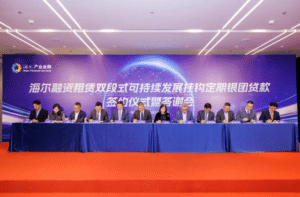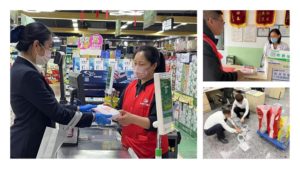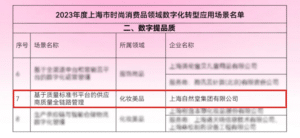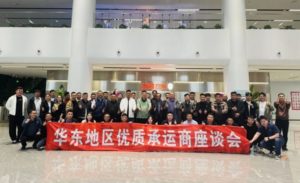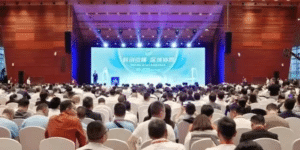Volvo Chinpeji: Adhere to long-termism and not rush for quick success
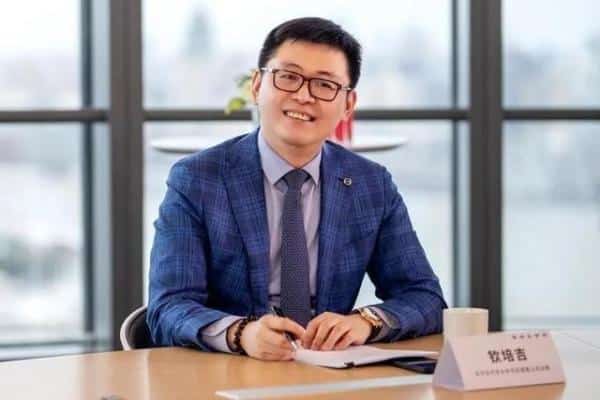
[ad_1]
Recently, Chin Peiji, President of Volvo Cars Greater China Sales Company, accepted an exclusive interview with DearAuto. Chin Peiji talked about his views on the future auto market, new energy, and new retail, and he highly agrees with many views, such as The next biggest challenge in the auto market is not the supply chain but the shrinking demand; of course, there are also things that I don’t take seriously. For example, Volvo’s pure electric sales will account for 50% in 2025…
It doesn’t matter, isn’t that what interviews should be like? No one’s point of view will be absolutely correct, but everyone must exchange their views candidly. The industry has been making great strides for so many years, and it is indeed time to seriously think about it.
01. “If the people are still there, the fighting power is still there”
DA: Let’s talk about Volvo’s market performance in the first half of the year.
Chin Peggy: In the first half of the year, Volvo’s market share in the luxury car market was basically stable, similar to that in the first half of last year. The market share of several of our large cars, such as XC90 and XC60, has increased, but the market share of several small cars has declined, because relatively speaking, the profits of small cars are poor. car supply.
However, in the first half of this year, the growth of small cars in the entire market was faster—this is generally the case when the economy is not good. So in the first half of the year, we still made a lot of efforts to stabilize the market share.
DA: Like?
Chin Peiji: For example, many dealers have started to lay off employees under pressure. We have introduced a “personnel retention plan” for front-line sales consultants and after-sales technicians. As long as they are still working at the end of June, I can make up 3,000 yuan per person. During the shutdown period of many dealers in Shanghai, the basic salary may be more than 2,000 yuan a month. We make up 3,000 yuan, and we can get an extra 1,000 yuan, which can help some people keep their jobs and not lose them.
Therefore, our market share in Shanghai rebounded very sharply in June. First, dealers basically still have personnel and combat effectiveness—it takes a lot of time and energy to train a new sales consultant; second, At present, the entire inventory of our dealers is not large, and there is no major problem with the dealer’s capital chain; the most important thing is that online sales have not stopped, which can ensure that our entire system can operate normally after a round of shocks.
Qingzhu said: Treating dealers kindly is treating yourself kindly.
02. “The supply chain has basically recovered, and the biggest challenge is shrinking demand”
DA: The chip shortage seems to be improving?
Chinpeggie: The supply chain challenge was the most serious last year, and it gradually recovered in the first half of this year. Now the entire Volvo supply chain has almost recovered—some models are still slightly affected. Looking at the second quarter, the shortage of chips has eased, and the recovery of the entire supply chain has been uneven. The biggest challenge for the auto market in the second half of the year is the shrinking demand.
June is the first month of the purchase tax reduction, which has played a role in the rapid recovery of the auto market, but I think the stimulus policy did not really stimulate the entire market, but only pushed the sales rhythm forward. Compared with before the epidemic, June China’s auto market did not explode, but returned to normal levels, which is different from the past and did not bring real growth.
According to our statistics, at the end of June, all luxury car brands are still cutting prices in addition to the preferential purchase tax policy, which shows that the market competition is unprecedentedly fierce.
In fact, the peak of the total domestic auto market has already appeared in 2017. Now new energy vehicles are exploding rapidly, but in fact they are only replacing fuel vehicles, not a net increase. In the second half of the year, the entire auto market I don’t think there will be an increase, but I just hope that the market can stabilize.
Qingzhu said: The macroeconomic situation will affect all industries, no industry can be an exception.
03. “Adhere to long-termism and not rush for quick success”
DA: The competition is indeed unprecedentedly fierce, and some brands have been eliminated by the market one after another.
Chinpeji: Yeah. Many times we also reflect on the fact that a brand that is successful in the United States or Europe may not necessarily be successful in China; China is a very unique market, and how much a brand respects the Chinese market will be as successful as it is. Usually, if a pure “foreigner” manages – this is not a prejudice – unless the brand appeal is super strong, or the whole team is particularly willing to understand China, it will be very difficult. The cliff-like decline of many brands in the Chinese market is also due to internal personnel changes or the transfer of localization teams.
A brand must not be eager for quick success, but must have long-termism. The reason why many brands have experienced a sharp decline in the past few years is that there has been a “Great Leap Forward” in the development process-I won’t talk about the specific brand-the sales volume has clearly climbed to the stage of 30,000 to 40,000 vehicles, but you suddenly want to sell 100,000, but are you ready? Does the brand support it? Is the entire product matrix enough? Is your target market share reasonable in each market segment? If you analyze it carefully, you will find that it is not enough.
▲I guess, is this talking about Infiniti? In 2017, Infiniti sold 48,000 vehicles in China. In 2018, the sales target in China was set at 100,000 vehicles. As a result, only 44,000 vehicles were sold, and then all the way down. In 2021, only 8,696 vehicles were sold.
This kind of story is still happening, and I can’t say which brand. It was developing very well, but last year all the dealers suddenly lost money. Why? Because the channel expansion is too fast! Moreover, when the brand foundation is not solid, it has already developed beyond the norm, and it will continue to develop beyond the norm. As a result, the channel collapses first, and the dealers go from very profitable to very unprofitable. Many brands are like this. They hold on and hold on to death, and then their confidence collapses, the market shrinks, morale is low, and the user experience in the store is very poor, and the whole system fails.
Therefore, we have been pursuing the establishment of a stable system, this is not empty talk!
Qingzhu said: Everyone understands the truth, but how many people can really do it?
DA: A concrete manifestation of your long-termism? for example.
Chin Peiji: Our goals will be adjusted as the market environment changes. Last year, our (sales) target was raised, and this year’s sales target will definitely be lowered, because we are facing supply cuts in the first half of the year and the epidemic in major cities. If we do not reduce production, there will be surplus in the second half of the year. Many times we joke that a company dies when 1,000 units are put in storage on the last day or when the last 1,000 units are sold to a leasing company.
Qingzhu said: Yaku is the root of all evil.
04. “Brand value is redefined in the era of electrification”
DA: You also said that new energy vehicles are booming now, but Volvo doesn’t seem to be enjoying this bonus.
Chin Peiji: Our sales of plug-in hybrids are pretty good, accounting for more than 30% of global sales, and more than ten percent in China, which is actually not low; last year we were still discussing whether plug-in hybrid sales could account for 10% of the total sales volume has accounted for 17~18% in the first half of this year, and it is still in the case of a shortage of supply.
In the long run, Volvo is still more focused on pure electric models. Now our two products, the XC40 pure electric and the new pure electric C40, actually cut into the relatively niche market. Next year we will have three or four new pure electric models. Volvo has always said that by 2025, our pure electric car sales will account for above 50.
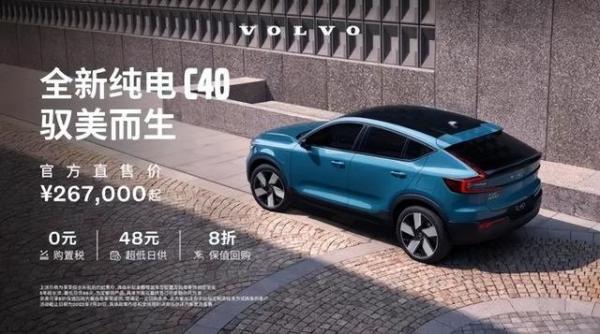
▲The C40 pure electric coupe SUV was just launched on July 5 this year, with an official price of RMB 267,000 to RMB 328,000.
DA: It is only a few years away from 2025. Will this goal not be adjusted?
Chinpeji: This goal has not changed for the time being, because we have not seen a reason why it cannot be achieved.
DA: In the era of electrification, what is the biggest challenge to traditional luxury brands like Volvo?
Chin Peiji: In the era of electrification, consumers do not follow the original brand recognition, which means that our original brand value cannot be naturally continued in new energy vehicles. Now it is difficult to distinguish what is a luxury car, we can only distinguish it by model and price.
If a consumer wants to buy a car worth more than 300,000 yuan, in the era of fuel vehicles, the first thing that comes to mind is Mercedes-Benz, BMW, Audi, and then Volvo, Lexus, Cadillac… But in the era of electrification, he will consider whether I want to buy Tesla or “Wei Xiaoli”.
Therefore, many traditional luxury brands are suffering in the new era, because they are not in the customer’s choice list, or they are at the bottom of the choice list. At this time, you have to compromise the price. For example, the price of electric vehicles of a certain luxury brand is much lower than that of gasoline vehicles, and there has been a serious price inversion, but the sales volume still fails to meet expectations, which fully shows that brand perception has changed.
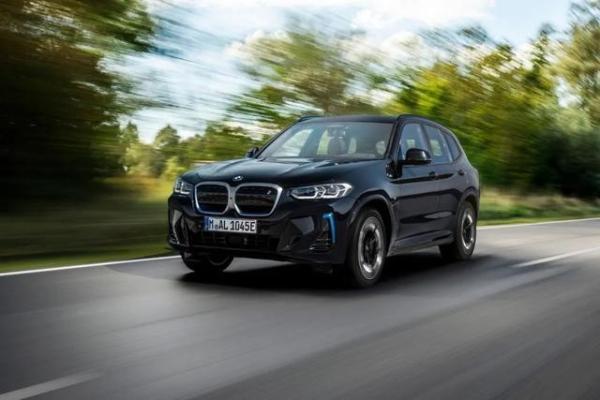
▲ The pure electric price of the BMW iX3 is lower than that of the BMW X3 fuel version. Even so, the sales volume is only a fraction of that of the X3. In June this year, the sales volume of the BMW iX3 was 2,262 units, while the sales volume of the BMW X3 was 12,701 units.
Qingzhu said: The change in brand recognition actually reflects the change in value logic, and traditional luxury brands must recognize this reality.
05. “Entering the pan-crowd era, the new energy market will inevitably return to rationality”
DA: So how will Volvo establish its brand value in the new era?
Chinpeji: It’s really hard, we’ve been discussing it internally, but I’m still confident. China’s new energy vehicle user group has transitioned from a radical niche group to a mainstream group, and the penetration rate in many places has reached 40%. It is actually a “pan-population”. Of course, these people are “educated” by the first group of people. It has passed, so there must be a period of brand chaos in the middle, but the more this is the case, the more we need to stick to our brand positioning.
I personally think that consumers will not distinguish between new power brands or fuel vehicle brands in the future, because gradually almost all manufacturers will join the new energy camp, but it is just a matter of time. Gradually, tram users will not say that they are particularly extreme in their pursuit of buying a brand new brand, and will eventually move towards the era of “pan-brand”.
When you buy your first electric car, you may have to try how fast it can speed up, and even better have a karaoke function, but when you buy a second electric car, you will feel that this is actually still a means of transportation. Two years ago, when we looked at the report on the purchase propensity of tram consumers, almost all of them were pursuing the ultimate, pursuing high-tech labels, and pursuing smart cockpits. Now there have been great changes. Recently, we have seen that “safety” has ranked sixth and seventh. Already – very close to the era of fuel vehicles. More and more tram consumers will comprehensively consider the overall quality and safety of the car.
Therefore, in the future, we will definitely stick to “safety, health, and environmental protection” and “respect people” in terms of branding. This is the root of why we are Volvo and the value of Volvo’s existence.
Qingzhu said: trams and gasoline trucks are all cars, and their essential attributes will not change.
06. “The supermarket model does not conform to business logic”
DA: Mainstream manufacturers are also learning from “new forces” and entering supermarkets. Is this a trend?
Chin Peggy: I think the supermarket model does not conform to business logic, because cars are ultra-long-term durable goods, the purchase cycle is very long, and the time for users to make a purchase decision is also very long-Volvo usually takes about a month, and no one will When I was shopping in a supermarket, I made up my mind to buy a car.
The role of this model is to cut into the brand influence at the front end of the consumption link. It has to be said that these direct sales consultants are much better than dealers in introducing brands and products, because dealers focus on the bargaining stage, and when manufacturers give him tasks, he will focus on the transaction. Introducing the price to you, I wish I could sell you all the financial insurance. This is determined by the original driving force.
We also encourage dealers to set up stores in supermarkets. I can’t say that all 280 dealers will open 280 stores in supermarkets, but we have plans, and we have opened 10 stores in the first half of the year. At least in the main cities, we also need to cut into the front end of the consumption chain, and we gradually squeeze the capabilities of dealers to the front end, so that it is basically similar to the model of new forces.
In fact, the new forces also have dealers, and they are also opening 4S stores, because 4S stores are a model that can reach deals relatively quickly. New forces also hope to strengthen the back end. Weilai, Xiaopeng, and Ideal have basically completed the stage of brand establishment, and they have to start considering costs. After all, a supermarket with two or three cars, if the location If it is good, the rental cost is equivalent to that of the entire 4S shop.
Some new power brands have begun to consciously withdraw some high-cost supermarkets. In the end, I guess everyone will reach a consensus on the channel, that is, 4S stores + supermarkets. Maybe Xiaopeng has hundreds of supermarkets plus dozens. A 4S store, and we may have more than 200 4S stores + 100 supermarkets.
Qingzhu said: The important thing is not where to open the store, but to improve the ability.
DA: In fact, it can also be understood that there has never been a static channel model, and it needs continuous change.
Chinpeji: Yes. In the entire industry, Volvo has spent more energy on channel changes. We are now using plug-in mix to do the agent system model, the dealer transforms into an agent, he does not need to prepare the inventory, all of it is with me; we can ensure the national one-stop price, if it is a dealer, this violates the anti-monopoly law.
The channel model is a test of operational capabilities. How do dealers transform and how do you coach them? Our own direct sales team will manage them in parallel after they enter, and set an example for them. It will take a lot of energy to motivate them. of. Once 4S stores are 100% standardized, they will be the same as direct sales.
I don’t think pure online sales will really be implemented in China. New forces also place equal emphasis on online and offline sales. We hope that dealers in first- and second-tier cities can use this (online) sales model to communicate with customers. When I entered the industry, I kept talking about “consultant sales”, but in the past 20 years, this industry has regressed. Have you consulted “sales consultants”? It has all become “bargain sales”.
[ad_2]
Source link


